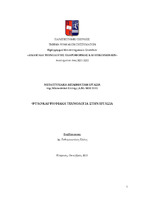Φύλο και ψηφιακή τεχνολογία στην εργασία
Gender and digital technology in work

View/
Keywords
Φύλο ; Τεχνολογία ; Έμφυλες διακρίσεις ; Έμφυλες ανισότητες ; Προκαταλήψεις ; 'Εμφυλα στερεότυπα ; Τεχνητή νοημοσύνη ; Ψηφιοποίηση ; Τηλεργασία ; Ψηφιακή πλατφόρμαAbstract
The present dissertation was carried out within the framework of the Master Program of the University of Piraeus in ΄΄Law and Information and Communication Technologies΄΄ and aims to examine the impact of digital technology on women's work, focusing on the interaction between gender and technology and their effects on work. This particular topic is considered to be of paramount importance, as it primarily concerns the protection and respect of human dignity and the fundamental ΄΄principle of equality΄΄, as legally enshrined (Article 14 ECHR & Article 4, para 1 of the Greek Constitution). In order to understand the topic, the educational and professional representation of women in the fields of science, technology, engineering, and mathematics (STEM) is initially explored, with a reference to their relationship with technology. Additionally, the concepts of "bias" and "discrimination" are discussed, along with an examination of the results of remote work and platform-based work in women's lives. Finally, legal measures and policies adopted at the European level to combat the inequalities experienced by working women in the modern era are analyzed. It is demonstrated that women are underrepresented in STEM education and, consequently, in related professional fields, while the pervasive and uncertain legal framework that covers modern labor relations is also identified. The central cause of gender inequality is identified in the position of modern women in capitalist society, both economically and socially, as well as in the stereotypes and gender biases that persist and therefore affect the development and evolution of the technological sector. In conclusion, the serious social and legal considerations arising from the use of new technologies at work are revealed, along with the deeper efforts required to empower digitally employed women.


